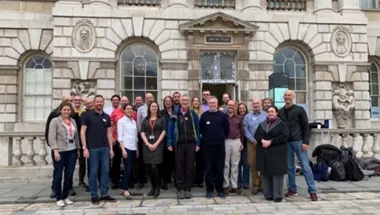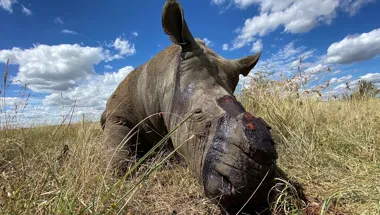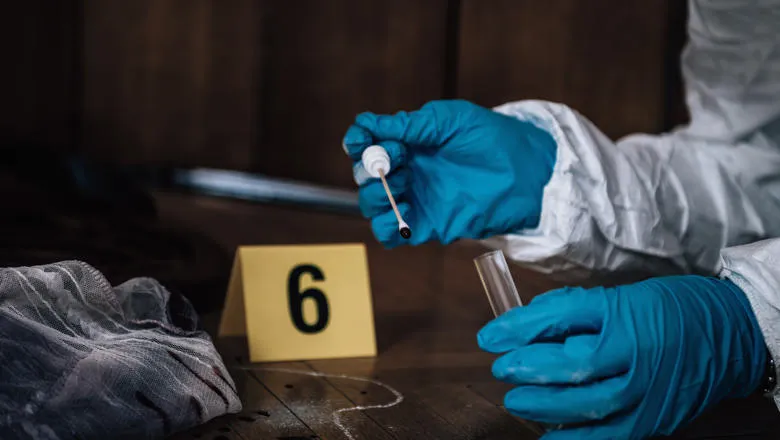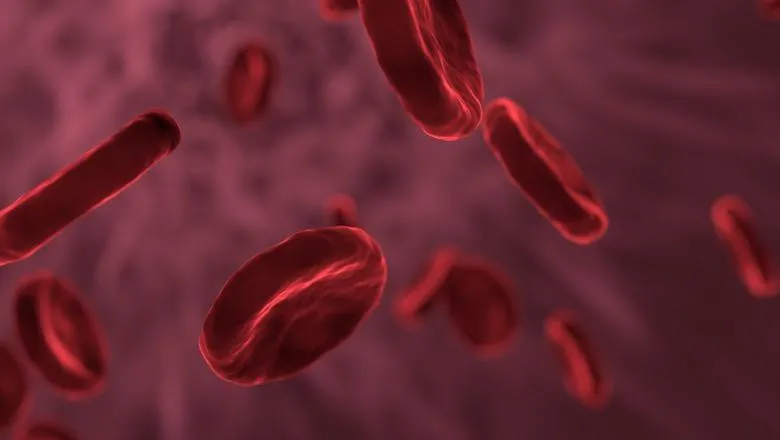
Dr David Ballard
Senior Lecturer in Forensic Genomics
Research interests
- Forensics
Biography
Dr David Ballard gained his first degree in Physiology from University College London in 1998, his MSc in Forensic Science from King’s College London in 2000, and his PhD titled “Characterization and differentiation of three British population groups” from the University of London in 2013. He is a senior lecturer in forensic genomics as well as the programme director for the MSc/MRes Forensic Science programmes. In this role, he leads these postgraduate degree programmes and teaches forensic genetics at both undergraduate and postgraduate level.
For the last 20 years Dr Ballard has combined forensic casework activity, as the principal scientist within the ISO17025 accredited DNA analysis at King’s laboratory, while conducting research in forensic genomics. His knowledge and expertise in DNA analysis is now being used to identify bushmeat versus legal meat products and to provide important genetic information on the pangolin genome that has not been well described in the scientific literature.
His current research interests are focused on massively parallel sequencing technologies and DNA intelligence applications including metagenomics and phenotype prediction. Please see his PURE profile for more details. He has published over 50 research articles that have gained over 2000 citations. Additionally, he is a member of the International Society of Forensic Genetics DNA Commission tasked to develop new international standards for the use of next generation sequencing technology in forensic DNA applications and recommend new nomenclature standards. He is also a member of the editorial board of Forensic Science International: Genetics.
Research

Forensic Genetics
Forensic Genetics is concerned with specialist ‘next-generation’ analysis of trace biological level evidence to solve crime, providing intelligence to law enforcement in forensic investigations.

Forensic Genomics: Genomic discovery of forensically relevant variation as revealed through massively parallel sequencing
Forensic genomics utilises massively parallel sequencing technologies to explore detailed information from forensic samples.
Project status: Ongoing

Implementation of massively parallel sequencing technology in kinship
The project focusses on kinship testing, which is the process by which we can use inherited DNA shared between individuals to work out how/if they are related.
Project status: Ongoing

Massively parallel sequencing technology in international criminal casework
This work builds upon the sequence characterisation and frequency determination of alleles at forensic STR and SNP markers.
Project status: Ongoing

Canine individual and breed identification
Exploring the usefulness of biological material of canine origin left directly by the dog or transferred by humans, and recovered from a crime scene.
Project status: Ongoing

International Forensics
The international forensics group has a wide remit to look at evidence from international sources, providing data to support research in criminal justice.

Tackling illegal wildlife crime through the development of novel methods for fingermark analysis
We have a training project in Zimbabwe ‘the use of fingerprints to combat wildlife crime’. This research project is the next stage to find improved methods.
Project status: Ongoing
News
King's joins €4.7 million project to modernise forensic DNA analysis
King’s has been awarded a share of a €4.7 million research grant to support a groundbreaking European project aimed at transforming how DNA is used in...

King's researcher helps to set standards for new forensic testing technique
Dr David Ballard joined a 20-person committee of international forensics experts to publish new recommendations for short tandem repeat (STR) sequences,...

A new method for analysis of bloodstains
Interdisciplinary teams at King’s have been working on research to provide new methods of analysis for blood stains at forensic crime scenes. New techniques...

Blood spatters reveal a suspect's age through new technique
Researchers at King’s College London have discovered a new method of forensic analysis which could more accurately predict the age of criminal suspects based...

Events

King's Forensics Postgraduate Information session -11 February 2026
Find out about studying Analytical Toxicology MSc and Forensic Science MSc at King's College London
Please note: this event has passed.
Features
Rosalind Franklin: How her legacy lives on
This weekend, July 25th, marks 100 years since the birth of Rosalind Franklin, one of history’s leading scientists. While working at King’s, Franklin famously...

Research

Forensic Genetics
Forensic Genetics is concerned with specialist ‘next-generation’ analysis of trace biological level evidence to solve crime, providing intelligence to law enforcement in forensic investigations.

Forensic Genomics: Genomic discovery of forensically relevant variation as revealed through massively parallel sequencing
Forensic genomics utilises massively parallel sequencing technologies to explore detailed information from forensic samples.
Project status: Ongoing

Implementation of massively parallel sequencing technology in kinship
The project focusses on kinship testing, which is the process by which we can use inherited DNA shared between individuals to work out how/if they are related.
Project status: Ongoing

Massively parallel sequencing technology in international criminal casework
This work builds upon the sequence characterisation and frequency determination of alleles at forensic STR and SNP markers.
Project status: Ongoing

Canine individual and breed identification
Exploring the usefulness of biological material of canine origin left directly by the dog or transferred by humans, and recovered from a crime scene.
Project status: Ongoing

International Forensics
The international forensics group has a wide remit to look at evidence from international sources, providing data to support research in criminal justice.

Tackling illegal wildlife crime through the development of novel methods for fingermark analysis
We have a training project in Zimbabwe ‘the use of fingerprints to combat wildlife crime’. This research project is the next stage to find improved methods.
Project status: Ongoing
News
King's joins €4.7 million project to modernise forensic DNA analysis
King’s has been awarded a share of a €4.7 million research grant to support a groundbreaking European project aimed at transforming how DNA is used in...

King's researcher helps to set standards for new forensic testing technique
Dr David Ballard joined a 20-person committee of international forensics experts to publish new recommendations for short tandem repeat (STR) sequences,...

A new method for analysis of bloodstains
Interdisciplinary teams at King’s have been working on research to provide new methods of analysis for blood stains at forensic crime scenes. New techniques...

Blood spatters reveal a suspect's age through new technique
Researchers at King’s College London have discovered a new method of forensic analysis which could more accurately predict the age of criminal suspects based...

Events

King's Forensics Postgraduate Information session -11 February 2026
Find out about studying Analytical Toxicology MSc and Forensic Science MSc at King's College London
Please note: this event has passed.
Features
Rosalind Franklin: How her legacy lives on
This weekend, July 25th, marks 100 years since the birth of Rosalind Franklin, one of history’s leading scientists. While working at King’s, Franklin famously...

